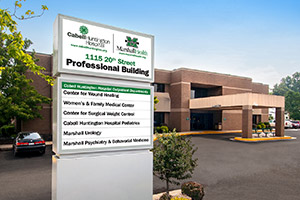Pelvic organ prolapse happens when an organ from the pelvic region drops from its usual position down into the lower part of the stomach and pushes against the walls of the vagina.
This often happens after childbirth as the muscles that structure the pelvic organs weaken or stretch. The most common type of prolapse is the bladder, but can also include the urethra, uterus, vagina, small bowel or rectum.
In order to diagnose a pelvic organ prolapse, your gynecologist will conduct a physical and pelvic examination. However, your symptoms may include:
Types of treatment for prolapse vary depending on your symptoms. Some symptoms can be easily treated by:
Your doctor may recommend pelvic floor therapy with a therapist.
However, if you experience ongoing symptoms, your doctor may discuss fitting you for a pessary to help ease pain and pressure.
If you continue to experience severe pain, bladder or bowel issues or painful intercourse, your doctor may suggest surgery. Types of surgeries include:
It is possible for pelvic organ prolapse to return even after surgery. Therefore, it is important to continue Kegel exercises to strengthen your pelvic muscles.
Clinical Interests:
Locations:

A provider-based department of Cabell Huntington Hospital
Marshall University Medical Center
1600 Medical Center Drive
Suite 4500 (4th Floor)
Huntington, WV 25701
Phone: 304.691.1400

An outpatient department of Cabell Huntington Hospital
Marshall Health - Teays Valley
300 Corporate Center Drive
3rd Floor
Scott Depot, WV 25560
Phone: 304.691.1800

A provider-based department of Cabell Huntington Hospital
20th Street Professional Building
1115 20th Street
Suite 107
Huntington, WV 25703
Phone: 304.691.1900